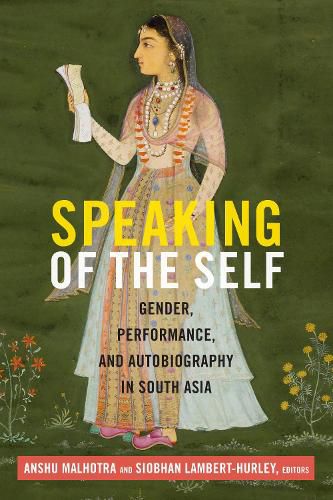Readings Newsletter
Become a Readings Member to make your shopping experience even easier.
Sign in or sign up for free!
You’re not far away from qualifying for FREE standard shipping within Australia
You’ve qualified for FREE standard shipping within Australia
The cart is loading…






Many consider the autobiography to be a Western genre that represents the self as fully autonomous. The contributors to Speaking of the Self challenge this presumption by examining a wide range of women’s autobiographical writing from South Asia. Expanding the definition of what kinds of writing can be considered autobiographical, the contributors analyze everything from poetry, songs, mystical experiences, and diaries to prose, fiction, architecture, and religious treatises. The authors they study are just as diverse: a Mughal princess, an eighteenth-century courtesan from Hyderabad, a nineteenth-century Muslim prostitute in Punjab, a housewife in colonial Bengal, a Muslim Gandhian devotee of Krishna, several female Indian and Pakistani novelists, and two male actors who worked as female impersonators. The contributors find that in these autobiographies the authors construct their gendered selves in relational terms. Throughout, they show how autobiographical writing-in whatever form it takes-provides the means toward more fully understanding the historical, social, and cultural milieu in which the author performs herself and creates her subjectivity.
Contributors: Asiya Alam, Afshan Bokhari, Uma Chakravarti, Kathryn Hansen, Siobhan Lambert-Hurley, Anshu Malhotra, Ritu Menon, Shubhra Ray, Shweta Sachdeva Jha, Sylvia Vatuk
$9.00 standard shipping within Australia
FREE standard shipping within Australia for orders over $100.00
Express & International shipping calculated at checkout
Many consider the autobiography to be a Western genre that represents the self as fully autonomous. The contributors to Speaking of the Self challenge this presumption by examining a wide range of women’s autobiographical writing from South Asia. Expanding the definition of what kinds of writing can be considered autobiographical, the contributors analyze everything from poetry, songs, mystical experiences, and diaries to prose, fiction, architecture, and religious treatises. The authors they study are just as diverse: a Mughal princess, an eighteenth-century courtesan from Hyderabad, a nineteenth-century Muslim prostitute in Punjab, a housewife in colonial Bengal, a Muslim Gandhian devotee of Krishna, several female Indian and Pakistani novelists, and two male actors who worked as female impersonators. The contributors find that in these autobiographies the authors construct their gendered selves in relational terms. Throughout, they show how autobiographical writing-in whatever form it takes-provides the means toward more fully understanding the historical, social, and cultural milieu in which the author performs herself and creates her subjectivity.
Contributors: Asiya Alam, Afshan Bokhari, Uma Chakravarti, Kathryn Hansen, Siobhan Lambert-Hurley, Anshu Malhotra, Ritu Menon, Shubhra Ray, Shweta Sachdeva Jha, Sylvia Vatuk